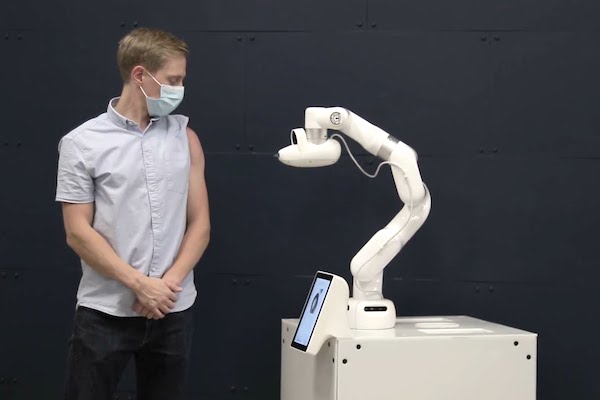Don't miss the latest stories
This Autonomous Robot Can Vaccinate People Without The Use Of Needles
By Alexa Heah, 08 Nov 2021
Subscribe to newsletter
Like us on Facebook

Video screenshot via Cobionix
While vaccines have been making the headlines since the start of the year, many people naturally still aren’t fond of being poked with needles. Knowing this, scientists are researching ways in which these life-saving medicines can be administered to patients without a shot.
Last week, researchers at the University of Queensland published findings on how a vaccine delivered via a skin patch was up to 40 times more effective than with a needle.
Now, a company founded by the University of Waterloo’s startup incubator has come up with another needle-less solution in the form of an autonomous robot, named ‘Cobionix’.
As per BGR, the robot, called ‘Cobi’ for short, has the ability to deliver an intramuscular injection—but without the use of a needle. Instead, it projects a high-pressure fluid jet, which is said to be thinner than a strand of hair, to administer the vaccine directly into a patient’s body tissues.
The robot makes use of its LiDAR sensors to create a 3D map of a patient’s body, allowing it to analyze and identify the best possible spot for the “injection.”
“Cobi is a versatile robotics platform that can be rapidly deployed to complete tasks with 100% autonomy,” said Tim Lasswell, co-founder of Cobionix.
“We outfitted Cobi to use a needle-free injection technology, and to demonstrate that patients could receive intramuscular injections, such as vaccines, without needles, and no involvement from a healthcare professional.”
With the healthcare sector under enormous strain, autonomous robots such as Cobi could help lighten the load on doctors and nurses, helping with routine tasks such as vaccinations, taking of vital signs, or even administrative duties.
In addition, according to Interesting Engineering, Cobi’s skills aren’t just limited to assisting in healthcare.
Its founders posited that the robot could be used in cleaning and hospitality industries, and by just tweaking the code slightly, it’ll be able to perform an entirely different set of functions, suited to whichever industry it is assigned to.
Notably, unlike other robots, Cobi doesn’t have to be constantly surveilled by a human handler, as it’s been designed to function all on its own. This could help decrease the current costs of “employing” robots and make it more useful for work in areas where there’s no supervision.
If you’re planning to get an automated needle-less jab any time soon, it may take a while. Cobi still requires two more years to be fully developed, but hopefully by then, it’ll join a growing range of ways we can receive vaccinations without being pricked.
[via Interesting Engineering and BGR, cover image via Cobionix]
Receive interesting stories like this one in your inbox
Also check out these recent news





